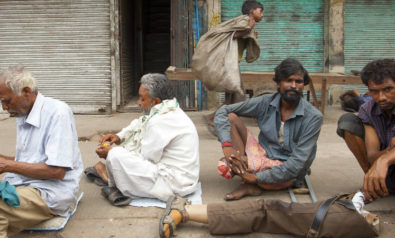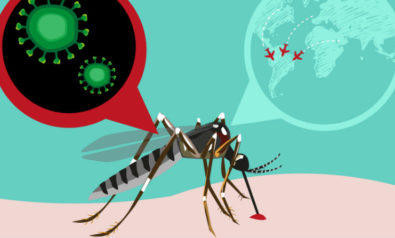Greater education about a healthy diet and lifestyle and increased exercising facilities for women are needed to fight obesity in Morocco.
Like many developing countries, Morocco is in the midst of a health transition. Until recently, infectious diseases and undernourishment posed the greatest threats to Moroccans’ health.
But due to changing demographics, diets and lifestyles, Moroccans are increasingly threatened by the same chronic diseases that plague the Western world: heart disease, cancer, diabetes and obesity. The rising rates of these diseases are results of changing trends in diets and lifestyles as the Moroccan population becomes wealthier and more urban.
Obesity is steadily on the rise in Morocco, affecting over 20% of the population. While the public fight against obesity is familiar to Americans, such efforts are far more complex in a country that is still simultaneously battling undernourishment.
A generation ago, far more Moroccans were threatened by undernutrition than by overnutrition. Rising incomes, urbanization and globalization have all contributed to increased food security in Morocco in recent decades, as well as greater availability of new and different kinds of foods. All of these factors have combined to change dietary consumption patterns in the country, putting many Moroccans at high risk for obesity and its associated health problems.
Globalization has been a major force behind dietary change in Morocco. The introduction and popularization of Western food products like Coca Cola and pasta have increased Moroccans’ already high intake of sugars and carbohydrates.
Western fast food chains such as McDonald’s, Pizza Hut and Burger King are now commonplace in urban Morocco. Unlike the United States, these fast food chains are still prohibitively expensive for average Moroccans, and are frequented instead by urban, middle- and upper-class Moroccans. The McDonald’s in Fes, for example, is considered a destination for a nice night out on the weekends among the middle-class Moroccans residing in the Ville Nouvelle (the new part of the city).
Western influences aside, particularities in Moroccan culture and cuisine also play major roles in the obesity epidemic. Traditional Moroccan cuisine is very high in carbohydrates. Bread has long been a staple of North African cuisine, and is used as a utensil to consume savory meat and vegetable stews called tajines. These dishes are heavy in meat and oil, which Moroccans sop up using their bread. Poorer Moroccans who cannot afford large quantities of meat in their tajines often compensate with high quantities of bread (oftentimes a small loaf per person per meal).
Ironically, very poor Moroccans who cannot afford meat at all tend to have healthier diets that are centered on beans and pulses such as lentils and chickpeas. Because the ability to purchase meat is still a sign of wealth in Morocco, most people who can afford meat eat and serve it abundantly.
Sugar is also a major culprit of the rising obesity rates in Morocco. A staple of the Moroccan diet, sugar is used in abundance to sweeten Morocco’s “national drink”: mint tea. Moroccan mint tea is itself an early example of globalization affecting traditional cuisine, as the drink is prepared using green gunpowder tea from China, local mint and sugar, which was originally imported. Most Moroccans drink multiple glasses of sugary mint tea a day. The drink is the centerpiece of many important daily rituals in Morocco—most notably when welcoming guests.
What’s the Cause?
Obesity affects women at far higher rates than men. Of Morocco’s 300,000 obese people, 63% are women. There are a few factors at play here.
First, female fatness is still considered a sign of beauty, fertility and prosperity in many parts of Morocco, especially the south. In contrast to the Western obsession with thinness, many Moroccan men still prefer women with significant amounts of body fat, which they see as correlated with a woman’s wealth and readiness to bear children. Marriage and children are highly coveted in Moroccan society.
Second, the lack of opportunities for women to exercise regularly is also to blame for the gender differential when it comes to obesity in Morocco. Many Moroccan women feel uncomfortable exercising publicly, due to frequent sexual harassment and cultural norms in many areas that make it abnormal for a woman to exercise in the streets, especially alone. Of course, many rural Moroccan women spend most of their days performing difficult physical labor, which partially explains why obesity affects urban women more than rural women. While men can frequently be seen jogging or playing soccer outdoors, women face far greater cultural barriers to participating in the same activities.
Third, obesity in Morocco is positively correlated with income, but negatively correlated with education. This suggests that access to more expensive and highly caloric Western food products such as fast food and soft drinks is a major culprit in the rise in obesity rates, especially in urban areas. It also shows that as Moroccans become more educated, they are able to make healthier choices related to diet and lifestyle and are at less of a risk for becoming obese.
As the Moroccan government begins to acknowledge overnutrition as a major health risk alongside undernutrition, greater education about a healthy diet and lifestyle and increased exercise opportunities for women would go a long way in fighting obesity.
The views expressed in this article are the author’s own and do not necessarily reflect Fair Observer’s editorial policy.
Photo Credit: Curioso / Shanti Hesse / Shutterstock.com
 We bring you perspectives from around the world. Help us to inform and educate. Your donation is tax-deductible. Join over 400 people to become a donor or you could choose to be a sponsor.
We bring you perspectives from around the world. Help us to inform and educate. Your donation is tax-deductible. Join over 400 people to become a donor or you could choose to be a sponsor.
Support Fair Observer
We rely on your support for our independence, diversity and quality.
For more than 10 years, Fair Observer has been free, fair and independent. No billionaire owns us, no advertisers control us. We are a reader-supported nonprofit. Unlike many other publications, we keep our content free for readers regardless of where they live or whether they can afford to pay. We have no paywalls and no ads.
In the post-truth era of fake news, echo chambers and filter bubbles, we publish a plurality of perspectives from around the world. Anyone can publish with us, but everyone goes through a rigorous editorial process. So, you get fact-checked, well-reasoned content instead of noise.
We publish 2,500+ voices from 90+ countries. We also conduct education and training programs
on subjects ranging from digital media and journalism to writing and critical thinking. This
doesn’t come cheap. Servers, editors, trainers and web developers cost
money.
Please consider supporting us on a regular basis as a recurring donor or a
sustaining member.
Will you support FO’s journalism?
We rely on your support for our independence, diversity and quality.



















